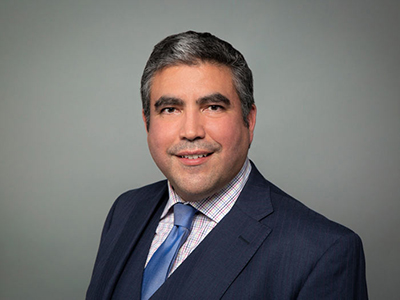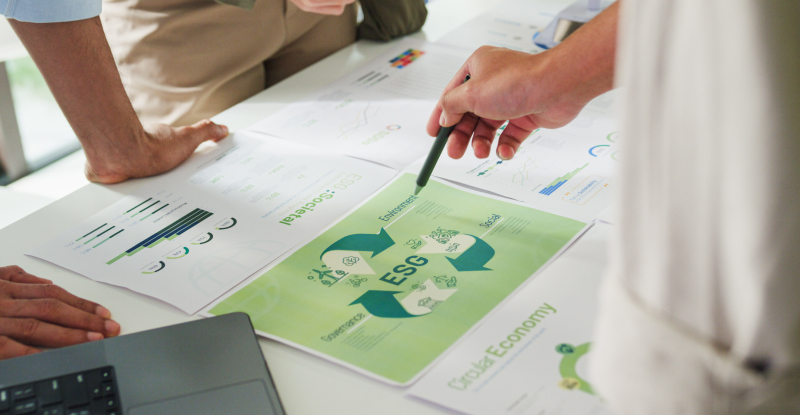
For Indigenous learners wanting to pursue an accounting and finance career, customized courses delivered by Indigenous instructors will be coming to BC in winter 2024. Learn more by visiting our Engaging Indigenous Learners page.
CPA Scott Munro explains how some of the answers to our current-day problems are found in traditional practices from our past that are now slowly being reclaimed
 Scott Munro, CPA, CA, deputy chief executive officer of the First Nations Financial Management Board in Vancouver, is passionate about seeing more Indigenous professionals take leadership roles to help address major issues impacting Canada.
Scott Munro, CPA, CA, deputy chief executive officer of the First Nations Financial Management Board in Vancouver, is passionate about seeing more Indigenous professionals take leadership roles to help address major issues impacting Canada.
After addressing CPA Canada’s 2023 ESG symposium, Munro spoke with CPA Canada about how Canadian businesses can benefit from incorporating Indigenous leadership, practices and values into their ESG-related activities.
You often read and hear about "seven-generational thinking," "seven-generational stewardship" and "seven-generational sustainability." Which phrase is most accurately used in Indigenous culture, and what does it mean?
Scott: ‘Seven-generational thinking’ is the phrase most often used by Indigenous people. This reflects the fact that we have always lived in balance and harmony with the natural world. We are part of the land. We are connected to the natural environment.
Our traditional ways of living are based on the knowledge and traditions passed down from our elders and ancestors, which have taught us, for example, that there are limits when harvesting natural resources.
Seven-generational thinking examines how today’s actions and decisions will impact the way people live, and emphasizes the need to understand the long-term impacts on future descendants and generations.
How have Indigenous people traditionally lived in harmony with the planet’s natural environment and its biodiversity patterns?
Scott: While Indigenous people make up only six per cent of the world’s population, we are caretakers or stewards of 80 per cent of the planet’s remaining biodiversity. That’s quite a remarkable statistic.
Indigenous people don’t try to control the natural environment, but rather live in harmony with it. For example, in B.C., the Coast Salish people respectfully harvest cedar bark for clothing, weaving, and for ceremonial purposes. In doing so, they are very careful to only take a limited amount of cedar bark each time so as not to harm the trees.
We give thanks to the land for what it gives us and only take what is essential.
Can those lessons from generations past be harmonized with today's fast-moving, technology-driven planet
Scott: The answer depends on whether policy makers, regulators and standard setters can take the time to consult with Indigenous people and make that a priority. We need to know that our points of view and our knowledge are being respected.
Some of the answers to our current-day problems are found in traditional practices from our past that are now slowly being reclaimed.
For example, traditional Indigenous agricultural practices were very successful, but those practices were outlawed and eliminated as a result of colonization. Returning to those regenerative agricultural practices would yield many benefits, including a more sustainable yield with less reliance on importing chemical fertilizers, which would also help reverse the loss of biodiversity.
Are there best practices that are practiced in Indigenous culture and lifestyle, and that businesses would be wise to adopt to appeal to socially responsible investors?
Scott: Rather than focusing solely on the financial bottom line or the single materiality aspect of shareholder value, Indigenous people take a wider stakeholder approach to also examine the impacts of corporate actions on the natural environment and on society.
Especially in a country like Canada, where so much of our economy is dependent on resource extraction, large energy projects or right-of-way corridors, public companies in these sectors are exposing themselves to risk if they don’t have Indigenous people on their board and senior management.
How can seven-generational thinking be applied to efforts by corporations to improve their environmental, social and governance (ESG) practices, and potentially reduce the harmful effects of climate change?
Scott: Seven-generational thinking can help businesses implement strong ESG practices if they are dedicated to focusing on long-term objectives over short-term results that capital markets tend to naturally reward.
Indigenous people are able to see signs and impacts of climate change much earlier than Western science because we are on the land all seasons of the year. We see the impacts on flora and fauna.
Many First Nation communities are migrating very rapidly to becoming reliant on solar energy and other forms of renewable energy. I think there is a willingness for First Nations to partner with renewable energy companies on projects to help them have a mitigating effect on climate change.
Please explain how Indigenous people can assist CPAs in their efforts to assess the financial value of the natural world, and the impact of business activities on those valuations.
Scott: At present, there are very few Indigenous CPAs, and so in the short term, including more Indigenous people in the accounting profession needs to be a key focus. This will help businesses reduce risk and identify opportunities earlier.
With respect to financial valuation of the natural world, we are recognized stewards of the land and have accumulated that traditional knowledge of how the land works, including very complex natural systems and bio-diversity, over thousands of years. We can help businesses evaluate, in a quantifiable way, the impact of their activities on the environment.
Do you believe that some regions of the world are further ahead than Canada and North America in terms of their sustainability-related laws and practices?
Scott: Other parts of the world are ahead. For example, the European Financial Reporting Advisory Group has been developing sustainability reporting standards for about 20 years. Europe also seems to be more willing than North America to consider the concept of double materiality.
The External Reporting Board in New Zealand, which develops and issues reporting standards on accounting, audit and assurance, and climate, has an Indigenous Reporting project underway focused on sustainability from a business perspective.
What does Canada need to do to align with sustainability best-practices in other jurisdictions around the world?
Scott: I don’t think we necessarily need to align with other jurisdictions. I think we have an opportunity to be leaders, and to build constructively, and accelerate some of the thinking, and maybe help push the boundaries.
There are signs of change. Canada has created the Canadian Sustainability Standards Board (CSSB). The CSSB needs to work with the International Sustainability Standards Board (ISSB), but also adapt requirements that suit the Canadian marketplace.
For example, a reporting issuer in Canada should ultimately have to report on how they are abiding by, for example, the United Nations Declaration on the Rights of Indigenous Peoples (UNDRIP), and acting on Call to Action #92 in the Truth and Reconciliation Commission’s Final Report here in Canada.
Please provide examples to illustrate how Indigenous people are leading efforts to improve corporate sustainability and/or ESG practices in Canada.
Scott: Yes. The National Aboriginal Trust Officers Association (NATOA) represents various trusts that Indigenous governments or Indigenous rights holders own and operate. It is setting expectations in the investing community that are based on principles contained in UNDRIP.
The First Nations Financial Management Board (FMB) has also been active in responding to consultation proposals and exposure drafts around ESG and sustainability that have been issued by regulators and standard setters. We are helping to bring more rights holders into this conversation, including more First Nations people.
I sit on the Public Sector Accounting Board as vice-chair, and I bring Indigenous points of view to the board, trying to accelerate policy changes that will make the public sector and business more inclusive of Indigenous peoples.
Some great work has already been accomplished, and we look forward to seeing more of these types of initiatives.
Jeff Buckstein, CGA, CPA (Ontario) is an Ottawa-based business writer who has written on accounting for Canadian newspapers and magazines since 1995.
Originally published by CPA Canada's news site.



